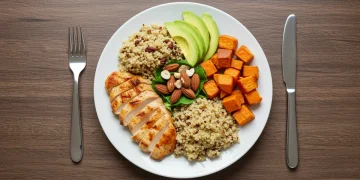Optimize Your Nutrition: Peak Fitness in 2025 US

This 2025 strategy guide provides actionable insights for optimizing your nutrition to achieve peak fitness routine performance in the United States, focusing on fueling your body effectively for superior results.
Are you ready to elevate your fitness game in 2025? Understanding how to fuel your body is paramount, and this guide on Optimizing Your Nutrition for Peak Fitness Routine Performance: A 2025 Strategy Guide for the United States. will provide the essential blueprint you need to unlock your full athletic potential.
Understanding the Foundation: Macronutrients and Micronutrients
To truly optimize your fitness performance, a deep dive into the building blocks of nutrition is essential. Macronutrients and micronutrients form the backbone of any effective dietary strategy, dictating everything from energy levels to muscle repair and overall bodily function. Ignoring either can significantly hinder your progress and impact your ability to achieve peak performance.
In 2025, the understanding of how these elements interact with an active lifestyle continues to evolve, emphasizing personalized approaches over generic guidelines. For athletes and fitness enthusiasts across the United States, tailoring nutrient intake to specific training demands is no longer a luxury but a necessity for sustained success.
The Power of Macronutrients: Fueling Your Body
Macronutrients—carbohydrates, proteins, and fats—are required in large quantities and provide the bulk of your energy. Each plays a distinct role in supporting your fitness endeavors.
- Carbohydrates: The primary energy source for high-intensity exercise. Complex carbohydrates provide sustained energy release, crucial for endurance and preventing fatigue.
- Proteins: Essential for muscle repair, growth, and recovery. Adequate protein intake helps prevent muscle breakdown and supports anabolic processes, especially after strenuous workouts.
- Fats: Vital for hormone production, nutrient absorption, and long-duration energy. Healthy fats, like those found in avocados and nuts, are crucial for overall health and performance.
Micronutrients: The Unsung Heroes of Performance
While needed in smaller amounts, micronutrients—vitamins and minerals—are indispensable for countless physiological processes that underpin peak fitness. They act as cofactors for enzymes, support immune function, and facilitate energy metabolism.
Deficiencies in key micronutrients can lead to reduced energy, impaired recovery, and an increased risk of injury or illness. Ensuring a diverse intake of fruits, vegetables, and whole grains is the most effective way to meet these needs, complementing your macronutrient strategy.
Ultimately, a balanced approach to both macros and micros establishes a robust nutritional foundation. This ensures your body has all the necessary tools to perform optimally, recover efficiently, and adapt positively to the demands of your fitness routine. Understanding this synergy is the first critical step toward optimizing your nutrition for peak performance in 2025.
Hydration: The Often-Underestimated Performance Factor
While much attention is given to food intake, proper hydration remains one of the most critical, yet frequently overlooked, components of peak fitness. Water constitutes a significant portion of our body weight and is involved in virtually every physiological process, from nutrient transportation to temperature regulation. For athletes, even mild dehydration can significantly impair performance, making optimal fluid intake a non-negotiable aspect of any serious fitness regimen.
In the United States, where diverse climates and activity levels prevail, personalized hydration strategies are becoming increasingly important. Simply drinking when thirsty is often insufficient, especially during prolonged or intense physical activity.
The Science of Hydration and Exercise
During exercise, your body loses fluids primarily through sweat. This loss can lead to a decrease in blood volume, which in turn reduces the efficiency of blood flow to muscles and the skin, affecting oxygen delivery and heat dissipation. The consequences of dehydration include:
- Reduced endurance and strength
- Impaired cognitive function and concentration
- Increased risk of heat-related illnesses
- Slower recovery times
Monitoring your hydration status, perhaps through urine color or body weight changes before and after exercise, can provide valuable insights into your individual fluid needs.
Electrolytes: More Than Just Water
While water is fundamental, electrolytes—minerals like sodium, potassium, calcium, and magnesium—are equally crucial, especially for those engaging in intense or long-duration exercise. These minerals help maintain fluid balance, nerve function, and muscle contractions.
Excessive sweating can deplete electrolyte stores, leading to muscle cramps, fatigue, and even more severe health issues. Sports drinks or electrolyte-rich foods can help replenish these vital minerals, particularly during extended training sessions or in hot and humid conditions.
Establishing a proactive hydration plan is paramount for anyone aiming for peak fitness. This involves not only drinking sufficient water throughout the day but also strategically incorporating electrolyte-rich fluids when needed. By prioritizing intelligent hydration, you provide your body with the optimal environment to perform at its best, recover effectively, and maintain overall health, ensuring your fitness routine yields maximum results in 2025.
Timing Is Everything: Pre- and Post-Workout Nutrition
Beyond what you eat, when you eat plays a pivotal role in optimizing your fitness routine performance. Strategic nutrient timing around your workouts can significantly influence energy levels, muscle recovery, and adaptation. Neglecting this aspect can leave you feeling sluggish, hinder your progress, and prolong recovery, making it a critical consideration for any fitness enthusiast in the United States aiming for peak results in 2025.
Pre-Workout Fuel: Preparing for Performance
The goal of pre-workout nutrition is to provide sustained energy and prepare your muscles for the demands of exercise. This typically involves a meal or snack consumed 1-3 hours before training, focusing on easily digestible carbohydrates and a moderate amount of protein.
Carbohydrates top up glycogen stores, which are your body’s primary fuel during exercise, while protein helps prevent muscle breakdown during intense activity. Avoiding high-fat or high-fiber foods close to a workout is often recommended to prevent digestive discomfort.
The ‘Anabolic Window’: Post-Workout Recovery
Immediately after exercise, your body is primed to absorb nutrients for repair and replenishment. This period, often referred to as the ‘anabolic window,’ is crucial for muscle recovery and growth. Consuming a combination of protein and carbohydrates within 30-60 minutes post-workout is highly beneficial.

Protein provides the amino acids necessary for muscle protein synthesis, repairing damaged muscle fibers and promoting growth. Carbohydrates replenish depleted glycogen stores, aiding in faster recovery and preparing you for your next session.
Examples of effective post-workout meals include a protein shake with a banana, Greek yogurt with berries, or chicken and rice. The specific ratios may vary based on individual goals and exercise intensity, but the principle of rapid nutrient delivery remains constant. Mastering pre- and post-workout nutrition ensures your body is always optimally fueled for both performance and recovery, maximizing every effort you put into your fitness routine.
The Role of Supplements in a Peak Fitness Strategy
In the pursuit of peak fitness, many individuals in the United States turn to supplements as a potential edge. While a well-rounded diet remains the cornerstone of optimal nutrition, certain supplements can complement your eating plan and address specific needs or deficiencies. However, it’s crucial to approach supplementation with an informed perspective, understanding that not all products are created equal and their efficacy varies significantly.
The 2025 landscape for fitness supplements is vast and often overwhelming. Prioritizing evidence-based choices and consulting with healthcare professionals or registered dietitians before incorporating new supplements is always advisable.
Evidence-Based Supplements for Performance
Several supplements have demonstrated consistent benefits in supporting fitness performance and recovery:
- Creatine: Enhances strength, power, and muscle mass by increasing the body’s capacity to produce energy rapidly during high-intensity, short-duration activities.
- Whey Protein: A fast-digesting protein source ideal for post-workout recovery, providing essential amino acids for muscle repair and growth.
- Branched-Chain Amino Acids (BCAAs): May help reduce muscle soreness and fatigue, and support muscle protein synthesis, especially during prolonged exercise.
- Caffeine: A well-known stimulant that can improve focus, reduce perceived exertion, and enhance endurance performance.
Supplements for General Health and Well-being
Beyond direct performance enhancement, certain supplements can support overall health, which indirectly contributes to better fitness outcomes:
Multivitamins: Can fill nutritional gaps, especially for those with restrictive diets or increased nutrient demands due to intense training. However, they should not replace a diverse diet.
Omega-3 Fatty Acids: Possess anti-inflammatory properties and support joint health, which is crucial for consistent training and recovery. Fish oil is a common source.
It’s important to remember that supplements are meant to supplement, not replace, a balanced diet. Their effectiveness is maximized when combined with sound nutritional practices, adequate hydration, and a consistent training regimen. Carefully chosen and properly used, supplements can be a valuable tool in your 2025 strategy for optimizing nutrition and achieving peak fitness.
Personalization and Tracking: The Future of Fitness Nutrition
In 2025, the era of one-size-fits-all nutrition is rapidly fading, replaced by a highly personalized and data-driven approach to fitness. Optimizing your nutrition for peak fitness routine performance increasingly relies on understanding your unique physiological responses, training demands, and lifestyle factors. This shift towards personalization, coupled with advanced tracking technologies, empowers individuals in the United States to fine-tune their dietary strategies for unprecedented results.
Genetic and Biometric Insights
Advances in genetic testing and biometric monitoring offer deeper insights into how your body processes nutrients, responds to different foods, and recovers from exercise. While still evolving, personalized nutrition based on genetic predispositions can help identify optimal macronutrient ratios, potential food sensitivities, and micronutrient needs.
Wearable devices now provide real-time data on heart rate variability, sleep quality, and activity levels, all of which influence nutritional requirements. Integrating this data allows for dynamic adjustments to your diet, ensuring it aligns perfectly with your body’s current state and demands.
Advanced Tracking and Analytics
Beyond basic calorie counting, sophisticated nutrition tracking apps and platforms offer detailed breakdowns of macronutrient distribution, micronutrient intake, and even hydration status. These tools allow for granular analysis of dietary patterns and their impact on performance metrics.
![]()
By consistently logging food intake and correlating it with workout performance, energy levels, and recovery times, individuals can identify optimal fueling strategies. This iterative process of tracking, analyzing, and adjusting is fundamental to continuous improvement in fitness nutrition.
Furthermore, working with a qualified nutrition professional who can interpret this data and provide tailored recommendations is invaluable. They can help navigate complex information and translate it into practical, actionable dietary plans. Embracing personalization and leveraging tracking technologies are key pillars of a forward-thinking fitness nutrition strategy, setting the stage for truly optimized performance in 2025.
Sustainable Nutrition Habits for Long-Term Success
Achieving peak fitness is not just about short-term gains; it’s about building sustainable habits that support long-term health and consistent performance. In the United States, where quick fixes often overshadow lasting change, developing a sustainable approach to nutrition is paramount for anyone serious about their fitness journey in 2025. This involves cultivating mindful eating practices, understanding behavioral psychology, and fostering a positive relationship with food.
Mindful Eating and Behavioral Change
Sustainable nutrition moves beyond rigid diets and calorie restrictions. It encourages mindful eating—paying attention to hunger and fullness cues, savoring meals, and understanding the emotional aspects of eating. This approach helps prevent overeating, promotes better digestion, and fosters a more intuitive relationship with food.
Identifying and addressing behavioral patterns related to eating, such as stress eating or emotional triggers, is crucial. Strategies like meal prepping, planning snacks, and creating a supportive food environment can significantly contribute to adherence and long-term success.
Flexibility and Balance
A truly sustainable nutrition plan is flexible, allowing for occasional indulgences without derailing progress. Strict deprivation often leads to rebound overeating and a negative cycle. Instead, focus on an 80/20 rule: 80% whole, nutrient-dense foods, and 20% room for flexibility and enjoyment.
Balance is key. Ensure your diet includes a wide variety of foods from all food groups to provide a full spectrum of nutrients. This prevents boredom, ensures nutritional adequacy, and makes healthy eating a more enjoyable and less restrictive experience.
Ultimately, sustainable nutrition is about integrating healthy eating into your lifestyle seamlessly, making choices that feel good and are easy to maintain. It’s about empowering yourself with knowledge and habits that support both your fitness goals and your overall well-being, ensuring that your pursuit of peak performance is a lifelong journey, not a temporary endeavor.
Addressing Specific Fitness Goals with Targeted Nutrition
While general principles of healthy eating apply to everyone, optimizing nutrition for peak fitness requires a more targeted approach based on specific fitness goals. Whether your aim is muscle gain, fat loss, or enhanced endurance, tailoring your dietary strategy can significantly accelerate your progress. In 2025, personalized nutrition plans are increasingly sophisticated, allowing individuals in the United States to fine-tune their intake to match their unique objectives.
Nutrition for Muscle Gain (Hypertrophy)
To build muscle, a caloric surplus is generally required, meaning you consume more calories than you burn. This surplus provides the energy needed for muscle protein synthesis and growth. Protein intake is especially critical, typically ranging from 1.6 to 2.2 grams per kilogram of body weight, to provide ample amino acids for muscle repair and building.
Complex carbohydrates are essential for fueling intense workouts and replenishing glycogen stores, while healthy fats support hormone production and overall health. nutrient timing becomes even more important here, with strategic protein and carbohydrate intake around training sessions.
Nutrition for Fat Loss
Achieving fat loss requires a consistent caloric deficit – consuming fewer calories than you expend. However, this deficit must be managed carefully to preserve muscle mass and maintain energy levels. Prioritizing lean protein intake is crucial to minimize muscle loss during a deficit, as protein has a higher thermic effect and promotes satiety.
Fiber-rich foods, such as fruits, vegetables, and whole grains, are important for fullness and digestive health. While reducing overall caloric intake, ensuring adequate micronutrient intake remains vital. Strategic carbohydrate timing, often around workouts, can help maintain performance without hindering fat loss.
Nutrition for Endurance Performance
Endurance athletes have unique nutritional demands, primarily centered around maximizing glycogen stores and maintaining hydration. High carbohydrate intake (often 6-10 grams per kilogram of body weight) is essential to fuel long-duration activities and prevent hitting ‘the wall.’
During prolonged events, intra-workout carbohydrate and electrolyte replenishment are critical to sustain energy and prevent dehydration. Adequate protein intake is also necessary for muscle repair and recovery, even for endurance athletes. Tailoring fluid and electrolyte strategies based on individual sweat rates and environmental conditions is also key.
By understanding these specific nutritional requirements for different fitness goals, you can develop a highly effective and targeted eating plan. This precision in nutrition allows you to not only reach your fitness objectives faster but also perform at an elite level, solidifying your 2025 strategy for peak fitness.
| Key Aspect | Brief Description |
|---|---|
| Macronutrient Balance | Proper intake of carbs, proteins, and fats for energy, muscle repair, and overall health. |
| Strategic Hydration | Maintaining fluid and electrolyte balance for optimal performance and recovery. |
| Nutrient Timing | Consuming specific nutrients before and after workouts to maximize energy and recovery. |
| Personalized Approach | Tailoring nutrition based on individual goals, genetics, and biometric data for enhanced results. |
Frequently Asked Questions About Fitness Nutrition
For optimal muscle growth, excellent protein sources include lean meats like chicken and beef, fish, eggs, dairy products (Greek yogurt, cottage cheese), and plant-based options such as lentils, beans, tofu, and quinoa. Prioritize a variety to ensure a full spectrum of amino acids.
While individual needs vary, a general guideline is to consume at least 8-10 glasses (about 2-2.5 liters) of water daily. Increase intake during exercise, hot weather, or if you consume dehydrating beverages like coffee. Monitor urine color for hydration status.
No, carbohydrates are not inherently bad for fat loss. The key is portion control and choosing complex carbohydrates like whole grains, fruits, and vegetables. These provide energy and fiber, which aid satiety and support a healthy metabolism within a caloric deficit.
Creatine is often taken daily, typically 3-5 grams, at any time. Whey protein is most effective when consumed post-workout, within 30-60 minutes, to aid muscle recovery and growth. Always follow product instructions and consult a professional.
Focus on small, consistent changes rather than drastic restrictions. Practice mindful eating, prioritize whole foods, allow for flexibility, and plan meals. Building a positive relationship with food and understanding your body’s cues are crucial for long-term adherence and success.
Conclusion
Achieving peak fitness in 2025 within the United States is undeniably intertwined with a meticulously optimized nutrition strategy. From understanding the fundamental roles of macronutrients and micronutrients to mastering strategic hydration and nutrient timing, every dietary choice contributes to your overall performance and recovery. Embracing personalization through genetic insights and advanced tracking technologies further refines this approach, allowing for truly tailored sustenance. Ultimately, building sustainable eating habits rooted in balance and mindfulness ensures that your journey towards peak fitness is not just effective but also enduring, fostering a healthier, stronger you for years to come.





